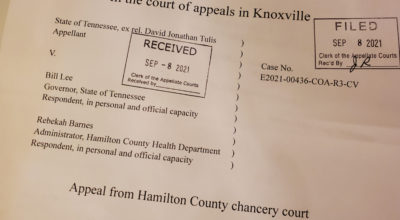
Lee Pope is the counsel for the office of open records counsel, part of state government, and he says whether the Tennessee judicial conference is open to the public hinges on the meaning of “meeting” and “vested” and “recommendations.” If policy is in view, if public action is in view — and these are discussed — it would appear that the public has a right to attend and the press to report. How is it that the judges can meet, and operate against the open meetings law by pretending that they are not recommending anything that affects the public interface with the judicial system? If you read the law — as I do in my demand letter to the chief justice — their meetings do affect the public interest, policy, the operation of the state. Only trickery and artifice might prevent one from seeing the connection.
State lawyer weighs secretive judge meetings
Thank you for contacting the Office of Open Records Counsel about attending the annual Tennessee Municipal Judges Conference and whether the conference is subject to the requirements of the Tennessee Open Meetings Act (“TOMA”).
TOMA provides that “all meetings of any governing body are declared to be public meetings open to the public at all times.” Tenn. Code Ann. § 8–44–102(a).
“Governing body” is defined, in pertinent part, as “[t]he members of any public body which consists of two (2) or more members, with the authority to make decisions for or recommendations to a public body on policy or administration….” Tenn. Code Ann. § 8–44–102(b)(1)(A). The Tennessee Supreme Court has explained that a public body subject to the requirements of TOMA includes any board, commission, committee, agency, authority or any other body, by whatever name, whose origin and authority may be traced to State, City or County legislative action and whose members have authority to make decisions or recommendations on policy or administration affecting the conduct of the business of the people in the governmental sector.” Dorrier v. Dark, 537 S.W.2d 888, 892 (Tenn. 1976).
Conference created by law
Here, the Tennessee Municipal Judges Conference is statutorily created pursuant to Tenn. Code Ann. § 17-3-301 and there is a board of governors that presides over matters for the conference. Accordingly, the Tennessee Municipal Judges Conference could arguably be considered a “governing body” subject to the requirements of TOMA if it has authority to make decisions or recommendations on policy or administration affecting the conduct of the business of the people in the governmental sector. [emphasis added]
It appears the AOC does not believe the judicial conference is a “governing body” subject to the requirements of TOMA because the judges do not meet to make decisions or recommendations on policy or administration at the conference nor do they have authority to make decisions or recommendations on public policy or administration. [emphasis added]
If the municipal judges conference does not have authority to make decisions or recommendations on policy or administration to some other governing body, it’s possible a court could find that it is not considered a “governing body” subject to the requirements of TOMA. [emphasis added]
‘Vested’ with authority — what does this mean?
While the statute creating the conference does direct the judicial conference to meet annually to consider matters pertaining to the discharge of the official duties and obligations of municipal judges, it does not appear to vest the conference with any authority to make decisions or recommendations to another governing body. [emphasis added]
Whether the judicial conference is considered a “governing body” subject to the requirements of TOMA would ultimately have to be decided by the courts, as the circuit, chancery and other courts with equity jurisdiction are vested with authority to enforce TOMA. See Tenn. Code Ann. § 8-44-106.
“Meeting” is defined under TOMA as “the convening of a governing body of a public body for which a quorum is required in order to make a decision or to deliberate toward a decision on any matter.” T.C.A. § 8–44–102(b)(2) (2002). In
Johnston v. Metro. Gov’t of Nashville & Davidson Cnty., 320 S.W.3d 299, 309 (Tenn. Ct. App. 2009), the Tennessee Court of Appeals clarified that a “meeting” occurs under TOMA when 2 or more members of a governing body discuss or deliberate matters a quorum of the governing body would need to vote upon. [emphasis added]
Is vote required for gathering to be ‘meeting’?
Here, a gathering of members of a governing body to obtain continuing education would not likely be considered a “meeting” of a governing body unless 2 or more members of a governing body begin to discuss or deliberate matters a quorum of the governing body would need to vote upon. [emphasis added]
Here, it is unclear whether the members of the judicial conference vote upon anything at the annual conference. It’s possible that members of the board of governors may be prohibited from discussing matters that the board of governor members may need a quorum to vote upon, if the board of governors is considered a “governing body” subject to the requirements of TOMA.
‘Governing body’ uncertainty
Our office is not involved with the judicial conference and we cannot say with certainty whether a court would determine the judicial conference is considered a “governing body” or whether an annual gathering of municipal judges would be considered a “meeting” subject to the requirements of TOMA.
If the judges that comprise the conference do not have authority to make decisions or recommendations to another governing body about public policy or administration and the judges attending the conference are not there to discuss or deliberate matters a quorum of the judges would need to vote upon that effect public policy or administration, it’s unlikely a court would find that the annual conference is a “meeting” of a “governing body” under TOMA.
If you believe the annual conference constitutes a meeting of a governing body that is subject to TOMA that should be open to the public, we would recommend seeking relief pursuant to Tenn. Code Ann. § 8-44-106 to enforce the provisions of TOMA.
Please let us know if we can be of any further assistance. Thank you!
Lee Pope
Open Records Counsel
Comptroller of the Treasury
Office of Open Records Counsel
425 Rep. John Lewis Way N. | Nashville, TN 37243
Open.Records@cot.tn.gov | 615.401.7891

